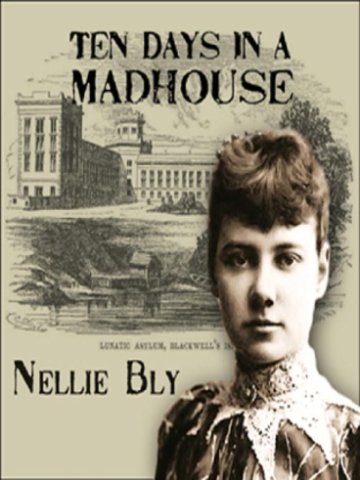Opera Philadelphia Presents 10 Days in a Madhouse
World Premiere by Rene Orth
By: Susan Hall - Sep 24, 2023
Rene Orth’s opera 10 Days in a Madhouse enjoyed a World Premiere at the Opera Philadelphia Festival. A tip off to where the weight lies in the opera was the stage set, immediately apparent when we enter the Wilma Theatre. The set is dominated by a Richard Serra-like sculpture. Our eyes and then our ears are fixed up where the orchestra tops the sculpture. Strings predominate. Yet we know, from Orth’s emerging work, that electronics will play a role.
They do. And for this subject matter, which is the mind in torment, the groans and growls of electronic sound enhance our experience in the moment. Describing states of mind and emotions is one of the most important jobs of opera. Orth commands this offering in spades.
Conductor Daniela Candillari, beginning to enjoy the moment she deserves in the big time, commanded the music with a perfect sense of phrasing, entrancing beginnings and clipped conclusions. Sometimes the music was lovely, launching the voices of Kiera Duffy as Nellie Bly, and Raehann Bryce-Davis, as the featured inmate, Lizzie, who offered an unusually complex and moving characterization of a mother whose baby daughter has died.
Nellie Bly’s story is well-known. She came from Pittsburgh to New York to become a journalist. Getting a job was difficult. When she wrote an article about how difficult it was for a woman to find work on a newspaper, she caught the eye of an editor. She offered to worm her way into an insane asylum and report on conditions. This was 1876, and the uptight Victorian period. In America, Dr. Benjamin Rush, author of the renowned Diseases of the Mind, which attributed madness to an inflammation of the brain's blood vessels, had started the movement to remove people with mental problems from prisons in the late 18th century. Ironic that this is where ‘mad’ people end up today.
By mid-century, a marvelous Philadelphia Quaker, Dr. Thomas Kirkbride, had been hired to run the University of Pennsylvania’s asylum, which has been fondly known forever as Kirkbride’s. The Roosevelt Island asylum depicted onstage was referred to by the name of its head doctor, Blackwell. Kirkbride’s was a private institution that housed family members of the Rittenhouse Square aristocrats who wished relatives out of sight and out of mind. The grounds had a natatorium where inmates swam. Art studios provided places to paint. Entertainments on Sunday evenings featured canaries signing and hymns.
We get some broken-up, distorted hymns in 10 Days. “Go Down Moses” is almost beyond recognition. These are not clear hymns like “Onward Christian Soldiers” of Nico Muhly’s Dark Sisters, another wonderful dark take on women’s perplexing circumstances.
In song, the 10 Days path to expressing mental distortion is often littered with “Wha,Wha,” stuttering, stammering 'mad' inmates guttural emissions of other women living in Blackwell’s. Although it is suggested that the women are placed in Blackwell’s because they are inconvenient, “Wha, wha” is an effort to indicate madness. It’s true that if the women were not mad when they arrived, they became mad in the asylum, often beaten and provided only watered-down soup to eat.
Will Liverman sings the doctor in charge. He is an attractive stage presence despite his very unattractive role. He attempts to seduce Nellie, the fake mad woman. Thomas Kirkbride actually married an inmate, which was thought perfectly acceptable in those days. A charming touch in 10 Days is the walk-on role of Victrola, whose needle is dropped to provide a waltz for the doctor and his patient to dance to.
The records of Kirkbride’s (officially the Pennsylvania Hospital) make clear that madness was a social construct that arose in response to embarrassing behavior. What madness is has never been clear. Certainly Orth helps us to feel the extreme pain of inmate Lizzie when her baby daughter dies. In public institutions, Bly’s article launched a reform movement.
What parts of this story are we left with today, for surely the opera provokes comment. I knew a New York madam well. She walked down Broadway barefoot at night. She would tape her mouth shut in order not to share the secrets of her top-brass clientele. She was together enough to maintain her establishment on East 63rd Street. Yet she seemed mad and was loose on the town.
The story here is told by the orchestra and it is a spectacular story in the hands of Orth and Candillari. Joanna Settle directs. Kiera Duffy is a wonderful actress with a wide-ranging voice and gestures to match. Yet the goings on at stage level feel like a dance before our eyes. Often darkened scenes spotlight the musicians.
One of the leading lights of Philadelphia history is the financier Stephen Girard. He had his wife Mary permanently committed to the Pennsylvania Hospital. It is often reported that Girard preferred his mistresses to his wife, but the current administrators of the Pennsylvania Hospital Archives think she was actually mad. The debate of “is she or isn’t she” is part of the orchestra’s lush performance in this production. It is an important question. Orth tackles it with music, which suggests one intriguing approach to the composition of modern opera. 10 Days in a Madhouse is not as much story as it is tone poem and it works.
10 Days in a Mad House
Music by Rene Orth
Libretto by Hannah Moscovitch
Performed in English with English supertitles
Part of Festival O23
Conducted by Daniela Candillari
Directed by Joanna Settle
Nellie Bly Kiera Duffy
Lizzie Raehann Bryce-Davis
Dr. Blackwell Will Liverman
Nurse Lauren Pear
Andrew Lieberman Set & Lighting Design
Faustin Linyekula Choreographer
Elizabeth Braden Chorus Master
Ásta Hostetter & Avery Reed *Costume Design
Alfreda "Fre" Howard Hair & Makeup Design
Zaina Yasmin Dana Assistant Directo
Gina Hays Stage Manager
Future performances on September 26 at 7pm, September 28 at 7pm and September 30 at 2pm.

